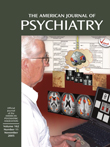Mood-Congruent Bias in Affective Go/No-Go Performance of Unmedicated Patients With Major Depressive Disorder
Abstract
OBJECTIVE: Neuropsychological studies of major depressive disorder have described attentional biases for affectively laden stimuli, but these reports were based on measures obtained from medicated subjects. This study investigated performance of unmedicated depressed patients on the Affective Go/No-Go Task. METHOD: Twenty depressed patients and 20 healthy comparison subjects, matched for age, gender, and IQ, performed the Affective Go/No-Go Task as well as tests of attention and memory for nonaffective stimuli. RESULTS: Depressed patients did not differ from healthy subjects on memory task performance, but they made more omission errors on the attention task. On the Affective Go/No-Go Task, depressed patients made more omission errors during happy than sad word blocks and required more time to respond to happy than to sad words. In contrast, healthy subjects required more time to respond to sad than to happy words. CONCLUSIONS: Unmedicated depressed patients do not show a pattern of generalized cognitive impairment but, rather, specifically display an attentional deficit and a mood-congruent bias toward salient stimuli.



